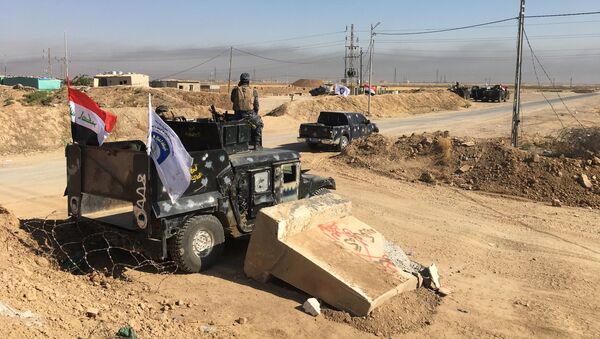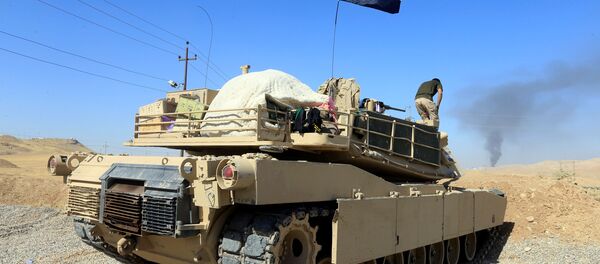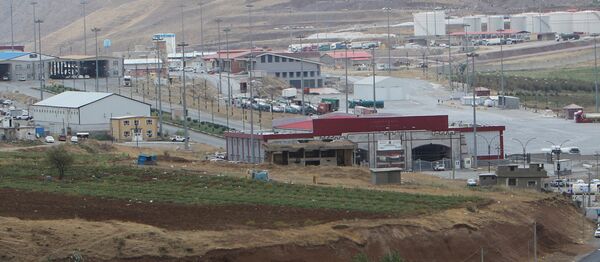MOSCOW (Sputnik) — The conflict between the Iraqi central government and the autonomous oil-producing Kurdistan region, which had escalated after the independence vote held by the latter, may lead to a short-term rally in oil prices above $60 per barrel but is unlikely to cause serious upheavals in the oil market, experts told Sputnik.
Following the independence vote in Iraqi Kurdistan, which also was held in Kirkuk, Baghdad launched a military operation in the oil-rich province, disputed by both the Within a day of the operation, the Iraqi forces gained control of most of Kirkuk, including oil fields and the administration building and have continued the operation, which has resulted in clashes with Peshmerga forces.
The global energy market has reacted to the operation in Kirkuk, with oil prices rising by 1.75 percent, to 58.17 per barrel, whereas the price of November futures for WTI rose by 1.46 percent to $52.2 per barrel.
READ MORE: Global Oil Prices Soar as Kirkuk Conflict Flares Up
Iraqi Kurdistan Oil Production
The Kurdistan region, located in northern Iraq, produces around 650,000 barrels of oil daily, which adds to 32.5 million tonnes of oil per year, including about 150,000 barrels a day from the disputed province of Kirkuk, Valery Nesterov, an analyst with the Sberbank CIB investment company told Sputnik.
The Kurdish oil is currently exported via the Erbil-controlled Kirkuk-Ceyhan pipeline through Turkey. The oil pipeline was built alongside an old one, controlled by the Iraqi government.
"The Iraqi government troops, which have seized Kirkuk province, say they are going to restore the old oil pipeline, having approximately the same capacity a year as the new one, 20-30 million tonnes, and use it, meaning [they will] place this export route under the control of the central government," Nesterov noted.
Possible Scenarios
A halt in oil production and transit from Iraqi Kurdistan is unlikely, since none of the parties is interested in reducing production volumes, Artyom Malov, a senior analyst with the Energy Center at the Skolkovo Business School, told Sputnik.
The expert suggested that Baghdad was likely to establish control over the export pipeline and Kurdistan's main oil fields. As soon as this happens, oil production and transit will be restored, Malov pointed out.
Earlier on Wednesday, the Kurdistan Regional Government offered the Iraqi central authorities a ceasefire in a statement, as well as to start a bilateral dialogue, expressing readiness to "freeze" the results of the region's independence referendum. According to the statement, the clashes between Iraqi troops and the Kurdish Peshmerga units would not be beneficial to anyone, instead they would have a negative impact on both sides and would "drive the country towards disarray and chaos."
In Nesterov's point of view, the idea of Kurdistan’s independence is nonviable.
"With Iraq and neighboring Iran and Turkey being against the idea, it is impossible to implement [the idea]. In other words, Kurdistan will not gain independence," Nesterov pointed out.
Another disagreement that needs to be resolved between Baghdad and Erbil is the distribution of oil revenues between Iraq’s central government and the Kurdish authorities.
"In the past, [the Kurdistan regional government] believed that Iraq and the central government were not paying out their oil revenues in full, so they set up independent oil exports," Nesterov explained.
In the case of the Kurdish oil exports halt, regular consumers will not be affected by it, as there is an oversupply of crude oil on the market, the expert continued.
"The market is flexible and it is possible to buy oil on the spot market from other sources," Nesterov explained.
In its October report, the International Energy Agency noted that a possible halt in the transit of oil from Iraqi Kurdistan via Turkish territory would mostly affect customers from Europe, where Italy is the largest consumer.
Market Reaction
Experts believe oil prices may exceed the $60-per-barrel mark as a result of the events in Iraq.
"Consumers will not be affected in any way, since the oil market is global, oil can be delivered from any part of the world to any customer and the imbalance will still be in the customers’ favor. Such risks are already partially embedded into the prices. Therefore, prices will not rise very much but will most likely exceed $60 per barrel," Raiffeisen Bank’s analyst Andrey Polischuk told Sputnik.
Malov, in turn, believes that the market has already recovered from Iraq’s production decline over the conflict with the Kurdish region, pushing the oil price to $58 per barrel.
"This will probably be a short-term rally, but the oil price may rise to $60 by the end of the year," Malov said.
The situation around the conflict between Baghdad and Erbil may rather affect the plans of companies that already have assets in Iraqi Kurdistan, for example, Chevron, Rosneft and Gazprom Neft, than any specific consumer, Malov suggested.
Gazprom Neft is continuing its operations in the region and moving ahead with its projects in Kurdistan, Russian Energy Minister Alexander Novak said. Rosneft CEO Igor Sechin, in turn, pointed out that his company was continuing oil production operations in compliance with local laws. The official also called for a universal approach toward foreign companies’ operating in Kurdistan, because they have nothing to do with politics.
Nesterov concluded by saying that all foreign oil companies operating in Kurdistan should have recognized the political risks involved in their investment. The investment that has already been made in existing production may have been recouped, but the investment in future production, geological exploration and other activities are greatly at risk, the expert suggested.





